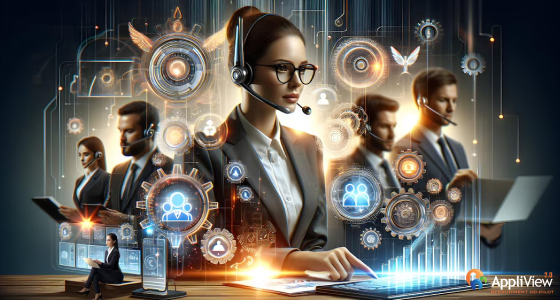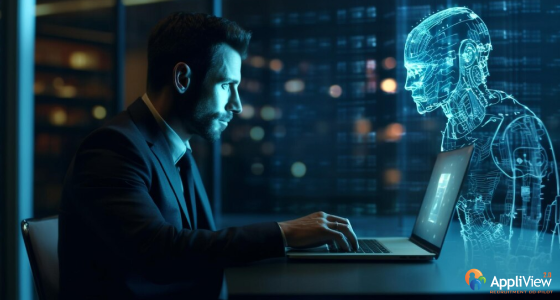An Essential Guide to Using AI in HR
May 3, 2024

Explore the transformative impact of AI on HR practices for businesses of all sizes, including large corporations, medium-sized enterprises, and startups. From simplifying recruitment procedures and boosting employee involvement to tailoring learning programs and refining HR analytics, AI presents a wealth of advantages.
An Essential Guide to Using AI in HR
In the dynamic landscape of modern business, staying ahead means embracing cutting-edge technologies that streamline operations and enhance efficiency. Among these technologies, AI stands out as a game-changer, particularly in the realm of HR. For large and medium-sized businesses, as well as startups, understanding how to harness the power of AI in HR is paramount for staying competitive and attracting top talent.
Understanding AI in HR
Before diving into specific strategies, let’s first grasp the essence of AI in HR. AI refers to the simulation of human intelligence processes by computer systems, including learning, reasoning and self-correction. In the context of HR, AI-powered tools and algorithms can automate repetitive tasks, analyze vast amounts of data and provide valuable insights to drive informed decision-making.
Streamlining Recruitment Processes

Recruitment is one of the most labor-intensive tasks in HR, requiring meticulous screening of resumes, conducting interviews and assessing candidate suitability. AI-powered applicant tracking systems can significantly streamline this process by automating resume screening, identifying top candidates based on predefined criteria and even conducting preliminary interviews through chatbots. By leveraging AI in recruitment, businesses can reduce time-to-hire, minimize bias in candidate selection and improve the overall candidate experience.
Enhancing Employee Engagement and Retention
Employee engagement and retention are crucial factors for organizational success, yet many businesses struggle to effectively gauge and improve them. AI offers innovative solutions in this regard by analyzing employee data, identifying patterns and predicting factors that influence engagement and retention.
Personalizing Learning and Development
In today’s rapidly evolving workplace continuous learning is essential for both individual growth and organizational agility. AI-driven learning platforms can personalize training programs based on employees’ skill gaps, learning styles and career goals, thereby maximizing the effectiveness of learning initiatives. By leveraging AI algorithms to analyze employee performance data and assess skill proficiency, businesses can tailor learning content and delivery methods to meet the unique needs of each employee.
Optimizing HR Analytics and Decision-Making
Data-driven decision-making is the cornerstone of effective HR management, and AI can supercharge this process by analyzing vast amounts of data and extracting actionable insights. AI-powered analytics tools can crunch HR data related to recruitment, performance, engagement, and retention, enabling HR professionals to make informed decisions quickly and accurately.From predicting future talent needs to identifying areas for process improvement, AI-driven analytics empower HR teams to proactively address challenges and seize opportunities.
Implementing AI in HR: Key Considerations

While the benefits of AI in HR are undeniable, successful implementation requires careful planning and consideration of various factors. Here are some key considerations to keep in mind:
- Data Privacy and Security : Ensure compliance with data privacy regulations and implement robust security measures to protect sensitive employee data.
- Ethical Use of AI : Guard against bias and discrimination by regularly auditing AI algorithms and ensuring transparency and fairness in decision-making processes.
- Employee Training and Change Management : Provide adequate training and support to employees to facilitate the adoption of AI-driven HR technologies and address any concerns or resistance to change.
- Integration with Existing Systems : Seamless integration with existing HR systems and workflows is essential to maximize the efficiency and effectiveness of AI implementations.
Conclusion
AI has the potential to revolutionize HR practices and drive significant value for businesses of all sizes. By leveraging AI-powered tools and algorithms, organizations can streamline recruitment processes, enhance employee engagement and retention, personalize learning and development initiatives, and optimize HR analytics and decision-making.
